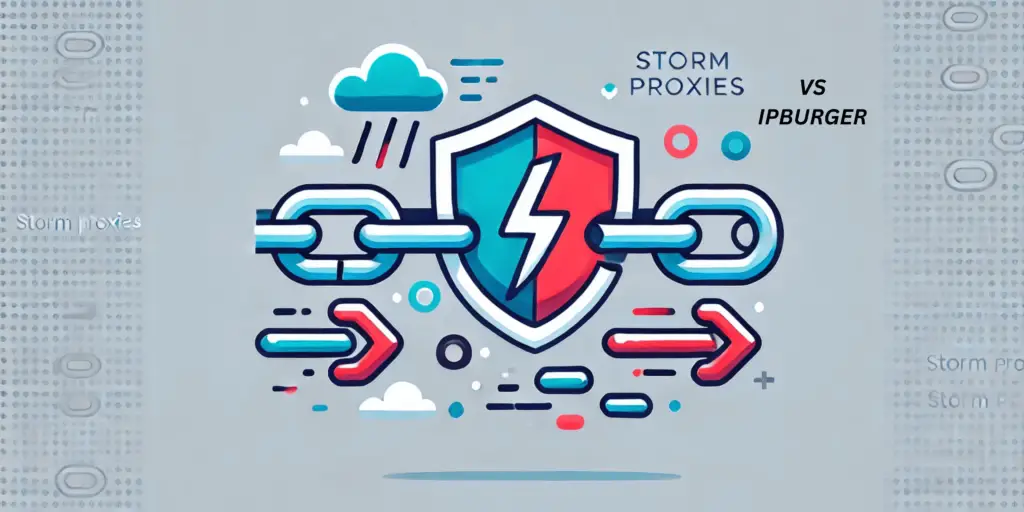Looking for a Storm Proxies Alternative?
Storm Proxies sells the dream: simple, affordable proxies that “just work.” And for some users? It kind of delivers.
Until it doesn’t.
Because here’s the reality—if you’re pulling small data sets, running light scraping jobs, or dipping your toes into sneaker copping, Storm Proxies feels like a steal. Cheap, quick, easy. But when you actually need reliability—when the stakes get higher—that’s where the cracks start to show.
Suddenly, your scrapers are slowing down.
Your IPs are flagged.
Your checkout window closes—before you ever got in.
And then you realize something:
Cheap proxies come at a cost.
For a lot of users, that’s the moment they start hunting for a Storm Proxies alternative. Not something flashy. Not something overcomplicated. Just a proxy network that actually keeps up—one that doesn’t choke under pressure.
That’s where IPBurger steps in.
This isn’t a “budget solution.” It’s a performance upgrade. More IPs. More speed. Real geo-targeting. And, yeah—reliability that doesn’t buckle the second you scale past beginner-level tasks.
Because when your project’s on the line, the last thing you need is another CAPTCHA wall or a failed data pull.
So—if you’re fed up with recycled IPs, slow connections, and proxies that almost get the job done? There’s a better alternative.
Let’s talk about it. 🚀

Who Uses Storm Proxies? (And Why They Eventually Look for Something Better)
Storm Proxies pulls people in for one reason—it’s cheap. It’s the kind of tool that feels perfect when you’re just starting out. You need proxies for scraping? Done. Trying to cop sneakers? Sure. Testing out web automation? It works.
But that’s exactly where the problem starts.
Because Storm Proxies is built for entry-level users. It thrives in low-stakes situations—small scraping tasks, basic SEO tracking, even some lightweight sneaker drops. It’s simple. It’s fast(ish). It’s affordable.
Until you want more.
The moment you push it—more data, more speed, more accuracy—it starts to fall apart.
Sneaker coppers? They know the pain. One second, you’re lined up for a drop, ready to hit checkout. The next? You’re throttled. Banned. Or worse, stuck behind a CAPTCHA wall while that limited release slips away.
Data scrapers hit that wall too. At first, Storm Proxies handles basic pulls just fine. But scale it up—add more threads, scrape more pages—and suddenly, you’re dealing with rate limits, flagged IPs, and broken scrapes.
And then there are the e-commerce pros. The ones tracking prices, stock availability, and competitor data. They’re not just scraping any data—they need geo-specific info. Localized prices. Regional stock levels. But with Storm Proxies? Good luck. No geo-targeting means you’re stuck with whatever data the IP gives you—whether it’s accurate or not.
Even privacy-focused users feel the squeeze. On paper, rotating residential proxies sound perfect for staying anonymous. But Storm Proxies’ smaller IP pool? It’s recycled. It’s overused. And eventually, platforms catch on.
That’s when users realize:
It’s not enough for a proxy to just work—it has to keep working when the pressure’s on.
And that’s where they start Googling: “Best Storm Proxies alternative.”
IPBurger shows up for a reason.
Next? Let’s dig into why people go for Storm Proxies in the first place—and where it starts to crack. 🚀

Why People Choose Storm Proxies (Until They Don’t)
Storm Proxies has a certain charm.
It’s simple. It’s cheap. It promises rotating residential proxies without burying you in complex setup guides or advanced features you’ll never use. For a lot of users, that’s enough—at least at first.
You click a few buttons, and boom—you’re scraping, copping, automating. No headaches. No deep dives into proxy management. It’s almost… effortless.
And then comes the price tag.
Storm Proxies is dirt cheap compared to bigger players. For someone running a couple of scrapers or dipping their toes into sneaker copping, that’s hard to ignore. Unlimited bandwidth? Rotating IPs? All for less than what you’d spend on lunch? It’s an easy “yes.”
For beginners, that simplicity feels like a win.
But then reality kicks in.
The unlimited bandwidth? Sounds great—until you realize there’s a cap on concurrent connections. That means fewer threads, slower scrapes, and missed opportunities when it matters most.
The rotating residential proxies? They work… until you notice the same IPs popping up again and again. That “rotation” isn’t as endless as it seemed, and soon enough, you’re running recycled IPs that are already flagged on half the sites you’re targeting.
And the simplicity? Yeah, it’s a double-edged sword. It’s perfect for basic tasks but leaves zero room for customization. Want geo-targeting? Can’t do it. Need to fine-tune sessions or manage specific IPs? Nope.
At some point, the cracks get hard to ignore.
That sneaker drop you missed because your proxy timed out?
That data scrape that pulled half-empty spreadsheets?
That competitor price check that gave you outdated info?
It’s the moment users realize they didn’t need the cheapest proxy—they needed the right proxy.
And that’s when the search for a Storm Proxies alternative really begins.
Because it’s not about finding another “budget” option. It’s about finding something that works when you actually need it to.
Next? Let’s talk about where Storm Proxies really falls apart—and why users eventually walk away. 🚀

Where Storm Proxies Falls Short
At first, it feels like you scored.
You got rotating residential proxies for the price of a cheap lunch. Unlimited bandwidth. Simple setup. Feels like a win.
But here’s the catch—Storm Proxies is built for beginners.
The cracks aren’t obvious at first. They sneak up.
You’re scraping, copping, running light automation… and then things slow down.
Not all at once.
But enough to notice.
Sneaker coppers know it best. One minute, you’re racing toward checkout. The next, your proxy freezes. Or worse—your IP gets flagged mid-drop.
Scrapers hit the wall, too. Pulling data from a small site? Smooth. Scaling up? Suddenly, you’re dancing with CAPTCHAs, retries, and broken data streams.
It’s not bad luck—it’s the IP pool.
Storm Proxies cycles through a small batch of residential IPs. Not bad for low-key tasks, but for anything serious? You’re just reusing the same tired IPs. The ones that websites already know. The ones that get blocked before the page even loads.
Then there’s geo-targeting—or the complete lack of it.
Scraping local data? Verifying ads in specific markets? Running SERP checks for a particular region? Storm Proxies says, “Good luck.”
Because you can’t pick where your IP comes from. It’s random. So if you need city-level targeting, or even country-level? You’re rolling the dice.
But the real kicker?
They hook you with unlimited bandwidth—and then quietly throttle how many connections you can run. You’re not scaling up. You’re just sitting in the slow lane, stuck behind users who got there first.
And when something breaks? You wait.
Support’s slow.
Sometimes unresponsive.
And usually, by the time you get a fix, the window you needed has slammed shut.
This is why users start searching.
They don’t want bells and whistles. They want proxies that work—fast, reliable, unflagged, and customizable.
Storm Proxies doesn’t offer that.
But IPBurger does.

Why IPBurger Is the Best Storm Proxies Alternative
It’s not about bells and whistles. It’s about proxies that work—every time.
That’s where IPBurger flips the script.
While Storm Proxies lures you in with cheap plans and “unlimited” bandwidth (that really isn’t), IPBurger focuses on what actually matters: reliability, flexibility, and raw speed.
Because when you’re scraping thousands of pages, copping sneakers in milliseconds, or verifying geo-targeted ads, “good enough” proxies just aren’t.
Here’s what makes IPBurger a real Storm Proxies alternative—not just another name on the list.
It starts with the IP pool.
100 million+ residential IPs. All ethically sourced. All clean. And unlike Storm Proxies, they aren’t recycled into oblivion. That means fewer CAPTCHAs, fewer bans, and a whole lot more completed scrapes.
Speed? It’s baked in.
IPBurger isn’t built for casual users pulling a few product pages—it’s optimized for high-volume data scrapers, sneaker coppers, e-commerce pros, and anyone who needs results now, not after three retries.
And unlike Storm Proxies, there’s full geo-targeting.
Country. City. Even ISP-level targeting if you need it. No more random IPs from halfway across the world when you need local data. You’re in control.
Then there’s the money part.
Storm Proxies feels cheap—until you realize you’re paying with failed scrapes, blocked IPs, and wasted time.
IPBurger? Transparent pricing. No hidden fees. No “oh, by the way” charges when you scale. What you see is exactly what you pay for.
And if something breaks?
No ticket queues. No radio silence. 24/7 human support. Real people, solving real problems, in real time.
Because when it’s 30 seconds before a sneaker drop or your scraper’s mid-pull on 10,000 pages, the last thing you want is your proxy collapsing.
Storm Proxies? It’s fine for casual users.
But if you’re serious about scraping, copping, or running anything that needs stability and speed—IPBurger isn’t just the better Storm Proxies alternative.
It’s the one that actually works.
Next? Let’s talk about when to ditch Storm Proxies entirely—and when IPBurger gives you the edge. 🚀
When to Choose IPBurger Over Storm Proxies
There’s always that moment—the one where you realize Storm Proxies isn’t cutting it anymore.
Maybe it’s the fifth failed scrape this week.
Maybe it’s another sneaker drop ruined by slow proxies.
Or maybe it’s just watching your data requests crawl while you scream into the void.
Either way, users hit that wall. And when they do? They start looking for an alternative that doesn’t feel like a gamble every time they hit “run.”
That’s where IPBurger steps in.
If you’re scaling up your scraping efforts?
Storm Proxies crumbles fast under pressure. Its limited IP pool, capped concurrency, and recycled addresses mean you’ll be tripping over CAPTCHAs and bans as soon as your scrapes get serious.
IPBurger? It’s built for scale. 100M+ fresh residential IPs, no weird bottlenecks, and the ability to run as many threads as your project demands.
Sneaker coppers and ticket hunters—this one’s for you.
Milliseconds matter. And if you’ve ever lost out on a drop because your proxy lagged? You already know.
Storm Proxies struggles under high demand. IPBurger, on the other hand, is optimized for speed. Faster connections, cleaner IPs, and zero concurrency limits. It’s designed for moments where “almost” isn’t good enough.
E-commerce pros, ad verifiers, SEO trackers—you need accuracy.
Storm Proxies doesn’t offer geo-targeting. That means your local ad verifications? Flawed. Your regional SEO tracking? Incomplete.
IPBurger hands you the keys—city-level targeting, ISP-specific filtering, country selection—all the control Storm Proxies can’t offer.
And then there’s privacy.
Storm Proxies uses a smaller, more recycled IP pool, and over time, that creates risk. Shared IPs mean higher chances of bans, leaks, and platforms connecting dots you don’t want them to.
IPBurger uses 100% ethically sourced residential IPs with no P2P mess, ensuring total anonymity.
So, when should you make the switch?
- When scale matters.
- When speed can’t fail.
- When geo-targeted data is non-negotiable.
- When privacy actually needs to be private.
- When you’re tired of paying less but getting way less.
Because Storm Proxies works—until it doesn’t.
And when that happens? IPBurger is the Storm Proxies alternative that actually shows up.
Next? Let’s throw them side-by-side and see how they really stack up. 🚀
Storm Proxies vs. IPBurger: The Ultimate Comparison
You’re here because you want the truth—which proxy provider actually delivers when it matters?
Storm Proxies talks a big game about affordability and simplicity. And for small projects? It holds up… for a while. But if you’re scaling up, chasing speed, or need precise data, it starts to crack.
IPBurger? Built to handle the pressure—without cutting corners.
Let’s lay it out:
| Feature | Storm Proxies | IPBurger |
| IP Pool Size | Small & Recycled | 100M+ Fresh Residential IPs |
| Geo-Targeting | None | Full Country, City, & ISP Targeting |
| Speed & Reliability | Slows Under Load | Fast, Stable, Unlimited Concurrency |
| Bandwidth & Concurrency | Unlimited Bandwidth, Capped Connections | Unlimited Bandwidth & Concurrency |
| Success Rate | ~85% (Frequent CAPTCHAs) | 99.95% (Low Ban Rate) |
| Pricing Transparency | Cheap Upfront, Hidden Trade-Offs | Clear, Transparent Pricing |
| Privacy & Anonymity | Basic (Recycled IPs, Higher Risk) | 100% Residential, Zero Data Leaks |
| Customer Support | Slow, Limited | 24/7 Real Human Support |
Here’s the takeaway:
- If you’re scraping a couple of web pages or running lightweight tasks, Storm Proxies will hold up.
- But if you’re scaling, copping, running geo-targeted campaigns, or handling sensitive data? You need proxies that don’t buckle under pressure.
And that’s where IPBurger pulls ahead.
More IPs.
More speed.
More control.
No hidden limits. No weak spots. No nonsense.
So, what’s it going to be—proxies that “kinda work” or ones that actually get the job done?
Next? Let’s wrap this up and send you off with a clear answer. 🚀
Why IPBurger Is the Smarter Storm Proxies Alternative
Storm Proxies promises the basics—cheap, simple, rotating proxies. And for some, that’s enough.
But if you’re here, you’ve probably hit the wall.
The failed scrapes.
The endless CAPTCHAs.
The sneaker drops missed by milliseconds.
The geo-targeted data you never quite got right.
Because with Storm Proxies, there’s always that moment—where “affordable” starts feeling expensive.
You start counting failed requests.
You start questioning the speed.
You start wondering if there’s something better.
There is.
IPBurger was built for users who expect more.
- More speed.
- More control.
- More reliability.
No recycled IPs.
No random bans.
No racing against bandwidth caps.
Just clean, fast, stable proxies—every time.
And when something breaks? You won’t be left waiting days for a canned support email. IPBurger’s got 24/7 human support—real people, solving real problems, in real time.
So, if you’re still asking, “Is it time to make the switch?”—you already know the answer.
Why settle for basic when you can scale without limits?
👉 Ditch Storm Proxies. Choose IPBurger—the smarter, faster alternative. 🚀
FAQs
Why is IPBurger the best Storm Proxies alternative?
IPBurger offers a larger IP pool, faster speeds, and full geo-targeting, all with transparent pricing and 24/7 human support. Unlike Storm Proxies, it’s built for high-demand scraping, sneaker copping, and privacy-focused users.
Does IPBurger offer geo-targeting for data scraping and ad verification?
Yes. IPBurger lets you target proxies by country, city, or ISP—perfect for local SEO tracking, ad verification, and geo-specific data scraping, which Storm Proxies doesn’t support.
Is IPBurger better for sneaker copping and high-speed drops?
Absolutely. With unlimited concurrency and a 99.95% success rate, IPBurger ensures faster checkout speeds and reliable connections during high-demand events like sneaker drops and ticket sales.



